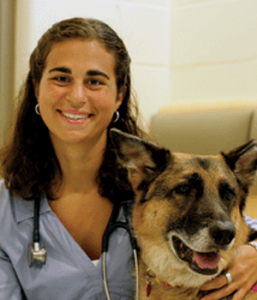-
Adopt
-
Veterinary Care
Services
Client Information
- What to Expect – Angell Boston
- Client Rights and Responsibilities
- Payments / Financial Assistance
- Pharmacy
- Client Policies
- Our Doctors
- Grief Support / Counseling
- Directions and Parking
- Helpful “How-to” Pet Care
Online Payments
Referrals
- Referral Forms/Contact
- Direct Connect
- Referring Veterinarian Portal
- Clinical Articles
- Partners in Care Newsletter
CE, Internships & Alumni Info
CE Seminar Schedule
Emergency: Boston
Emergency: Waltham
Poison Control Hotline
-
Programs & Resources
- Careers
-
Donate Now
 by Angela Mazza, DVM
by Angela Mazza, DVM
Angell General Medicine Service
Angell.org/generalmedicine
617-522-7282
Osteoarthritis is one of the most common debilitating diseases in dogs, especially as they age. Osteoarthritis results from deterioration or loss of the cartilage that acts as a protective cushion between bones, particularly in weight-bearing joints. As the cartilage is destroyed, an inflammatory response perpetuates further damage to the cartilage and eventually, there is bone-on-bone contact. This damages the bone and produces chronic irreversible change. The most common joints affected in dogs are the knee (stifle), hip, ankle (tarsus), wrist (carpus), elbow and shoulder. Osteoarthritis develops from wear and tear that increases in athletic animals, obese animals, or when the joint is congenitally abnormal and in some cases develops after a trauma.
How do I know if my dog has arthritis?
Some of the clinical signs of arthritis are more subtle in the early stages. Owners may notice that their dog is stiffer in the morning or after getting up from rest. They may see their dog taking more time to sit. This may progress to reluctance to go up and down stairs or to jump in the car. Eventually, your dog may refuse to go for long walks, may have an obvious limp or develop an abnormal gait. Some dogs chew at or lick at their painful joint(s) and some may even yelp or wimper as a sign of pain.
 What can I do to control my pet’s arthritis?
What can I do to control my pet’s arthritis?
You do not have to accept arthritis as a normal consequence of aging. Like most diseases, arthritis is progressive and intervention is best made early in the course of disease. Veterinarians use a multimodal approach to the treatment of arthritis. The most common aspects of treatment include environmental management, weight control and exercise, neutraceuticals, pain medications, and acupuncture.
Environmental management includes providing a warm, dry environment with adequate bedding and footing to prevent slipping. Some owners purchase ramps to assist their dog in areas where climbing is required.
Weight control is very important to minimize stress on the diseased joints. Just as with people, a lean body condition can be achieved with calorie control and exercise. Exercise not only helps burn calories, but also helps increase lean muscle mass. It may seem counterintuitive to recommend exercise to an animal that has joint pain, but starting with low impact and/or non- weight bearing exercises is very helpful. Walking and swimming are two great options for arthritic dogs. These activities should not result in increased pain. If needed, smaller more frequent episodes of activity can be done to achieve the same outcome. Some dogs can handle slow jogging but in general, you should avoid activities that put significant pressure on joints such as sprinting, chasing Frisbees, and repetitive jumping.
Neutraceuticals are nutritional supplements that support cartilage structure, prevent further deterioration of cartilage, suppress inflammation, and reduce free radical damage. Two of the most common products used are glucosamine and chondroitin and essential fatty acids. You can use one or the other, but they may be more beneficial used together and early in the disease process. There are some diets that have these ingredients added, but otherwise, talk to your veterinarian about the appropriate supplementation for your dog.
The most common medications used in the treatment of arthritis belong to a class of drugs called non-steroidal anti-inflammatory drugs (NSAIDs). As the name implies, these drugs provide pain relief by decreasing inflammation in the joint. There are several medications within this class. Your veterinarian will work with your dog to determine if this medication is appropriate based on the overall health of your dog and likely will recommend baseline labwork before starting this type of medication especially if long term use is expected. There are other medications that can be used alone or in combination with NSAIDs to provide maximum pain control. Some other drugs include tramadol, gabapentin, and amantadine.
Acupuncture, massage, and laser therapy are other adjunct treatments that relieve pain in some dogs and are often utilized in dogs that cannot tolerate some or all of the more common medications used to treat arthritis.
If you are concerned that your dog is exhibiting symptoms consistent with arthritis, you should have him evaluated by your veterinarian for a full physical exam and to discuss what treatment options are best for you and your pet. There is not one recipe of treatments that work for every dog so you need to work closely with your veterinarian to help your dog feel his best. There is help for your dog. Your best friend does not have to live with pain!
For information about Angell’s General Medicine service, please visit www.angell.org/generalmedicine or call 617-522-7282.